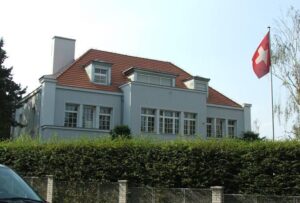 The Embassy of Switzerland in Harare, Zimbabwe, through its eight large solar panels can now generate up to 160 kilowatts (KW).
The Embassy of Switzerland in Harare, Zimbabwe, through its eight large solar panels can now generate up to 160 kilowatts (KW).
During the joint commissioning with the Minister of Energy and Power Development, Fortune Chasi, Switzerland’s Ambassador to Zimbabwe, Zambia and Malawi, Mr Niculin Jager said Zimbabwe is a great place to invest in solar energy given its climate and conducive regulatory framework.
The project is the adoption of Switzerland’s intention to become a zero-carbon emission country, and to fight climate change. The setup of the eight-panel began in 2010 and it can power the entire mission and its residences.
The Ambassador spoke with pride as the installation is one of the largest solar installations carried out by a Swiss Embassy in the region.
He said, “Solar power is a key part of our ‘sustainable embassies’ programme and further proof of Switzerland’s global commitment to environmental protection. I hope this project will inspire others.”
The Minister also commented saying renewable energy is one of the ways forward for the country if an uninterrupted power supply is to be achieved.
“Solar power is a practical solution for Zimbabwe, not only because the country has high levels of sunshine, but also because it is clean and could save the country money that is used to import electricity.”
“Climate change means that we have to look at alternatives, and I am happy with this investment from Switzerland which is in line with Zimbabwe’s energy policy that promotes a transition to clean energy.”
Over the years, Zimbabwe has stepped up efforts to encourage the use of renewable energies.
There is about 135MW of renewable energy is being fed into the national grid which is about 6% of the total electricity capacity of the country.
One of those is the Electricity Act of 2003 that led to the liberalisation of power generation, an act that allows Independent Power Producers (IPPs) in the renewable sector to generate and sell power to the national grid.
Also, in 2019, the government-approved renewable energy and biofuels policies which were to open up the energy sector to the private sector. Over 10 IPPs are currently operating in the renewable energy sector in the country and five other small solar power plants expected to add additional 14MW into the national grid are currently under construction
The new policy regime has encouraged a lot of private companies to install rooftop solar systems at their locations.